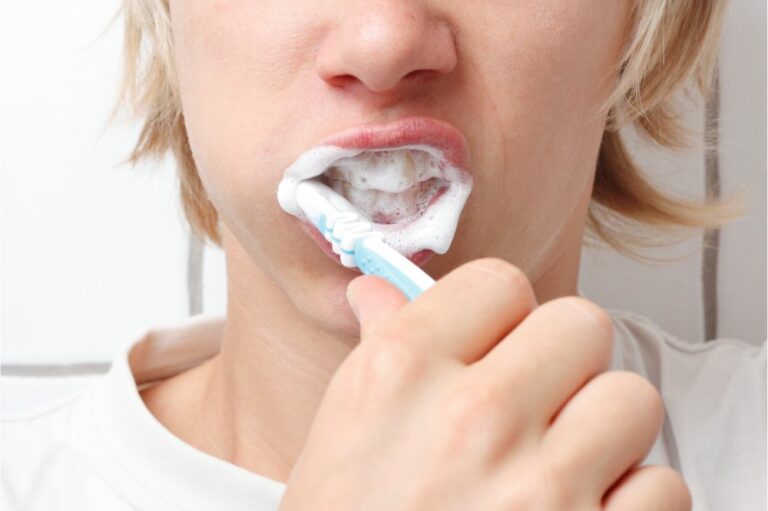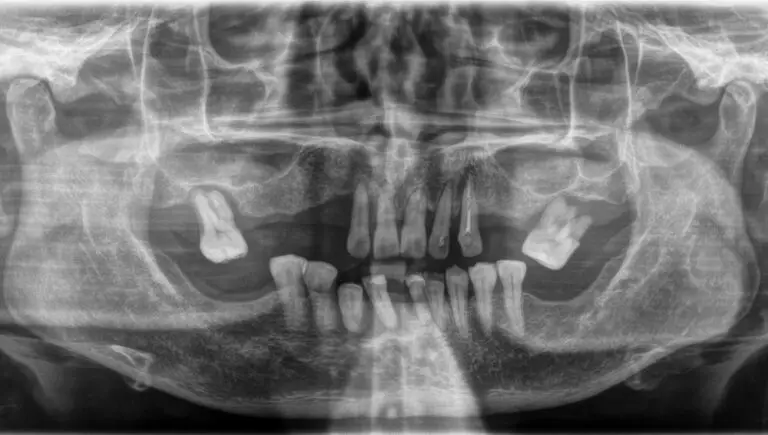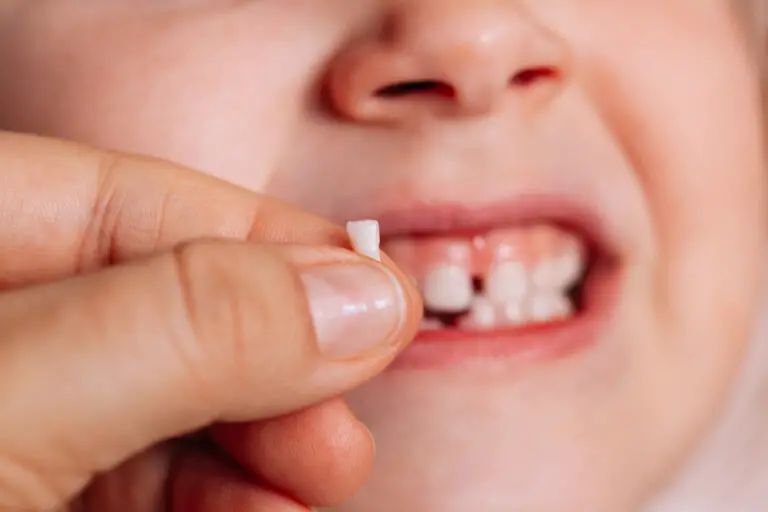Tooth chipping or cracking is an alarming but common problem that affects many people. You may one day be brushing your teeth and feel a sharp edge on a tooth, or bite into something hard and feel a piece of tooth shear off. This can be confusing and concerning, as our teeth are supposed to be durable and last our lifetime. However, there are a number of reasons teeth may chip and fracture more easily than they should.
When enamel is worn away or broken, it exposes the softer and more sensitive dentin underneath. This leads to pain, temperature sensitivity, and even possible nerve damage and infection if cracks extend deeply enough. Thankfully, there are preventative steps you can take to strengthen and protect your teeth from chipping. Understanding what causes the problem allows you to minimize damage and seek the right dental treatments to repair chips and cracks before they worsen.
What Causes Teeth Chipping and Fracturing?
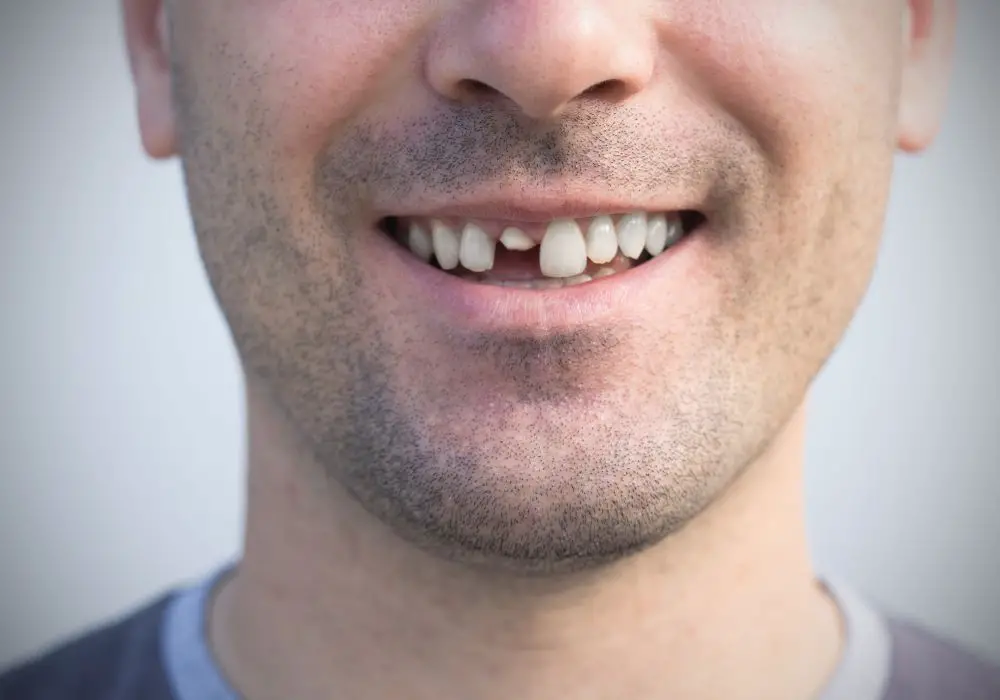
Teeth are incredibly strong and designed to withstand years of biting and chewing. So why do they suddenly chip or crack? There are three main reasons teeth may become prone to damage and breakage: mechanical factors, structural weaknesses, and defective dental work.
Mechanical Causes of Chipping
Our teeth endure a lot of force each day from biting and chewing. Mechanical factors that place excessive stress on teeth can eventually cause chipping, cracking and fracturing:
- Hard Foods: Biting into very hard foods like nuts, seeds, hard candy, popcorn kernels or ice can easily crack weak spots on the teeth. The hard enamel takes the brunt of the pressure and eventually fractures.
- Sports Injuries: Contact sports like hockey, football, basketball, and boxing often lead to direct blows to the mouth that can crack, chip or even knock out teeth. Wearing a protective mouthguard reduces this risk.
- Grinding and Clenching: Habitual grinding or clenching of the teeth puts tremendous biting force on the enamel. This constant pressure erodes and weakens enamel over time, making teeth far more likely to crack and fracture. Seeking treatment for temporomandibular joint disorders (TMJ) and bruxism can help manage grinding and clenching.
- Improper Brushing: Using excessive horizontal force while brushing with stiff-bristled toothbrushes or abrasive toothpaste can eventually wear down enamel. Over time this makes teeth more prone to chipping.
Structural Causes of Tooth Breakage
Our teeth’s internal structure also impacts their durability. Anything that weakens enamel or dentin can diminish tooth strength and lead to chipping or cracking:
- Tooth Decay: Cavities progressively damage and eat away at tooth enamel. The more advanced the decay, the weaker the remaining tooth structure becomes. Heavily decayed teeth often fracture during normal chewing.
- Large Fillings: Extensive decay requires larger fillings to restore the tooth. But excessive amounts of restorative materials like metal or composite resin can weaken surrounding enamel and dentin. This increases the chance of eventual cracking or fracturing.
- Worn Enamel: Enamel naturally wears down over decades of use. Once lost, it cannot regrow or regenerate. Advanced thinning of enamel from age or acid erosion exposes more of the vulnerable dentin and pulp. This significantly raises the risk of chipping.
- Gum Disease: Periodontal infections, inflammation and gingival recession can destroy the bones supporting teeth in their sockets. This causes teeth to loosen and shift, becoming more prone to fracture during biting.
- Clenching and Bruxism: Chronic teeth grinding or forceful clenching eventually wears down enamel. This mechanical weakening makes teeth far more susceptible to shearing and fracture.
- Aging: Our teeth’s inner dentin layer increases with age as the pulp chamber shrinks. Since dentin is softer than enamel, this proportional change reduces overall tooth strength and durability over time.
Dental Causes of Fractures
Finally, defective or improper dental work can also lead to tooth fractures:
- Poor Quality Fillings: Substandard composite fillings that are too large or tightly bonded can eventually crack teeth as they expand and contract with temperature changes.
- Ill-Fitting Crowns and Veneers: Dental crowns and veneers rely on proper fit and bonding to adequately protect the underlying tooth. Poorly fitting or weak restorations can concentrate biting forces and cause fractures.
- Overly Tight Braces: Excessive force from orthodontic braces and wires produces high compression points against enamel. This constant pressure can eventually cause cracking and chipping.
How Do Dentists Diagnose Cracked Teeth?
Dentists have a variety of methods for detecting cracked, fractured or chipped teeth:
- Visual Inspection: Your dentist will first thoroughly examine the biting surfaces, sides and edges of your teeth under good lighting and magnification. This allows them to pinpoint any missing enamel, cracks, or fractures.
- Dental X-Rays: X-rays allow your dentist to see below the visible tooth surface for any hidden structural damage like subsurface cracks extending into the dentin. Fractures too small to see can be found.
- Biting Exam: You’ll be asked to bite down on a dental stick, hard surface, or tool so your dentist can check for cracked teeth due to pain or abnormal mobility while biting.
- Cold Sensitivity Testing: Applying extreme cold from air or liquid to the tooth’s surface will cause short, sharp pains in teeth with underlying cracks reaching the pulp nerve.
- Transillumination: Your dentist may shine a bright curing light through the tooth from behind. This transilluminates fractures, craze lines and cracks not visible under normal light.
- Dye Penetration: Colored dental dye applied to cracked teeth will penetrate through fractures and stain the underlying dentin. This allows easier visualization of damage.
Consequences of Cracked and Chipping Teeth
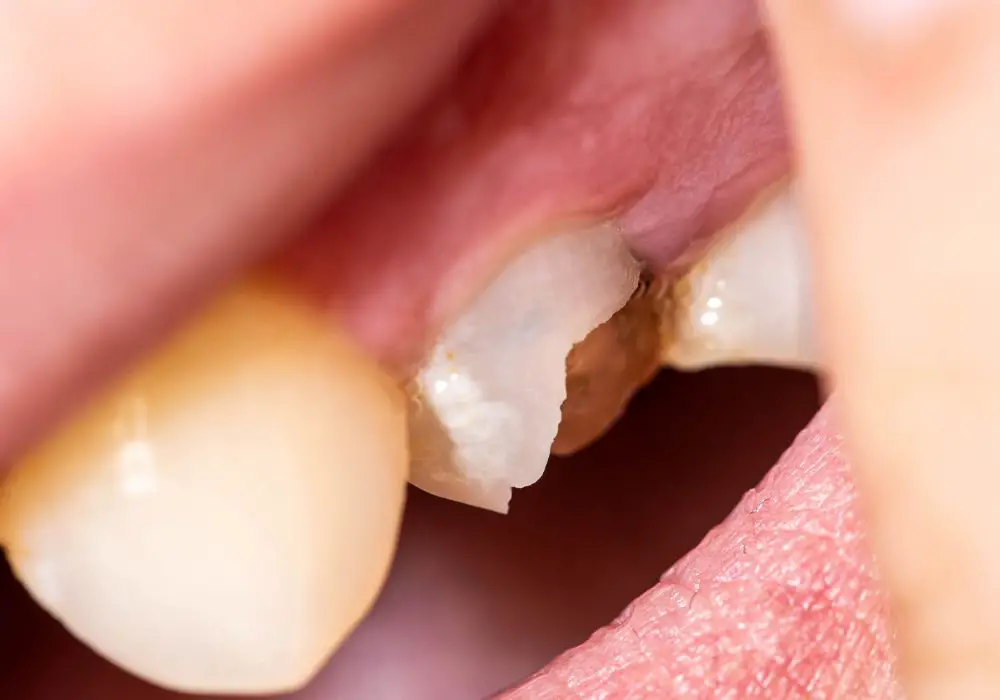
Small cosmetic chips may not cause any symptoms beyond aesthetic concerns. However, more severe tooth fractures and structural damage can lead to:
- Tooth Sensitivity: Loss of protective enamel exposes the highly sensitive dentin layer. This leads to increased sensitivity to hot, cold, sweet foods and beverages.
- Acute Pain: Cracked teeth may suddenly hurt when chewing or biting down due to compression of the inner pulp and nerve. The pain is often sharp and sudden.
- Infection: Bacterial invasion deep into the tooth’s center through extensive cracks can lead to pulpitis and abscessed tooth infections.
- Tooth Loss: Left untreated, severe cracks will progressively worsen, eventually resulting in loss of the tooth altogether. Prompt treatment is key.
- Jaw Joint Problems: Uneven tooth surfaces from chipping can alter your bite and occlusal forces. This can contribute to temporomandibular joint (TMJ) dysfunction and pain.
- Additional Fracturing: Existing cracks are starting points for further chipping and fracturing as they spread incrementally under biting forces.
- Cosmetic Issues: Visible chips and cracks create an unappealing smile. This can really undermine a person’s confidence and self-image.
Preventing Tooth Chipping and Fractures
While enamel loss and fractures may be inevitable with age, many proactive steps help minimize damage:
- Wear a Night Guard: Have your dentist make a custom night guard if you grind or clench your teeth to prevent enamel wear.
- Avoid Hard Foods: Select softer foods and avoid very hard or sticky candies that chip and fracture teeth.
- Use a Mouthguard: Protect your teeth from sports impacts and trauma by wearing a properly fitted mouthguard during activities.
- Pick Tooth-Friendly Snacks: Choose snacks like cheese, vegetables, fruit, yogurt and nuts instead of hard candies or ice.
- Brush Gently: Use extra-soft bristled toothbrushes and avoid sawing back-and-forth motions.
- Floss Regularly: Floss once daily to remove plaque and debris that cause enamel eroding decay.
- Get Small Fillings Fixed Promptly: Don’t wait for old fillings to get too large before repairing them to avoid cracks.
- Consider Dental Bonding: Have minor chips bonded sooner rather than later to avoid worsening.
- See Your Dentist Every 6 Months: Regular dental cleanings and exams detect problems early.
- Stop Habits: Curb habits like nail biting, chewing ice or using teeth to open items.
Repairing Chipped and Cracked Teeth
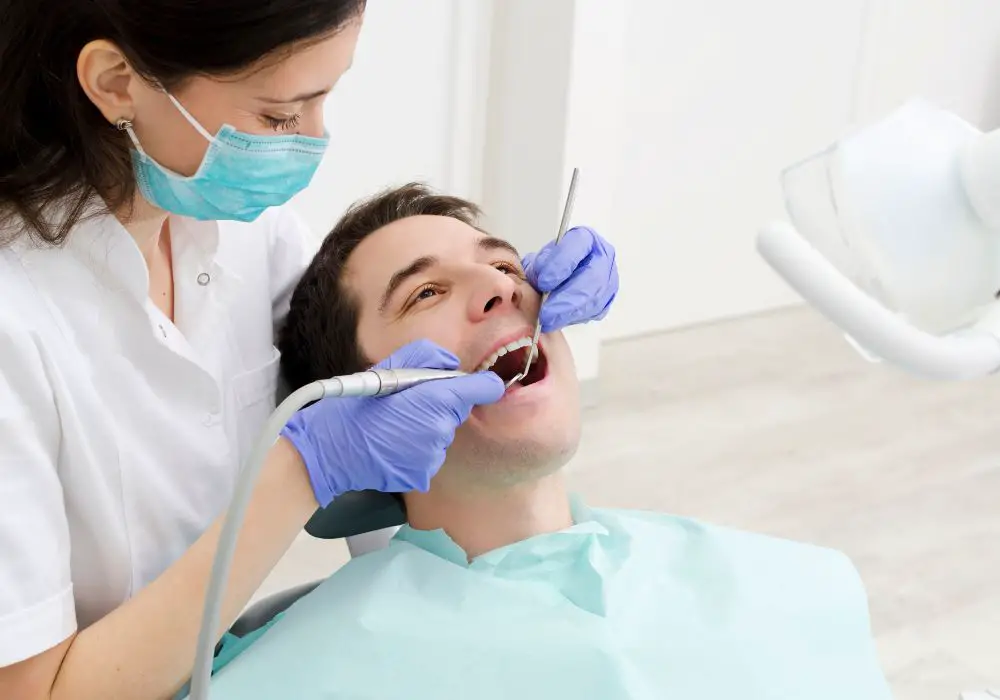
Several effective options exist for restoring cracked, fractured and chipped teeth:
Dental Bonding
Bonding with tooth-colored composite resin is ideal for minor chips and cracks in front teeth. The material bonds to enamel and dentin to seamlessly fill small defects for a natural appearance.
Dental Veneers
Veneers are custom-fabricated ultra-thin shells of porcelain or ceramic that cover the front surface of damaged teeth. They provide a beautiful aesthetic solution for extensively chipped or fractured front teeth.
Dental Crowns
Crowns (or caps) covered damaged teeth completely after filing them down. They are made of strong dental ceramics like porcelain fused to metal to provide protection and restore shape and function.
Root Canal Treatment
For cracks extending deep into the tooth’s center, a root canal is first needed to remove the pulp and prevent infection before placing a crown.
Tooth Extraction
In cases of severe, unrestorable tooth fractures, extraction may be the only option. Adjacent teeth can be bonded or bridged together for support. Dental implants are also excellent replacements.
Here’s a comparison of common methods for fixing chipped teeth:
| Treatment | Description | Cost | Durability |
|---|---|---|---|
| Dental Bonding | Composite resin applied directly to repair chips | $100-$400 per tooth | 5-10 years |
| Veneers | Thin porcelain shells bonded over front teeth | $925-$2,500 per tooth | 10-20 years |
| Crowns | Encapsulate entire tooth with ceramic cap | $800-$3,000 per tooth | 15-30 years |
| Root Canal | Removes pulp if crack extends to nerve | $300-$1,500 per tooth | Varies based on placement of crown |
Frequently Asked Questions
What should I do if I chip a tooth?
You should contact your dentist’s office promptly if you notice a chipped tooth. Minor cracks and chips can be smoothed and monitored, while larger fractures require dental treatment to avoid continued damage. Seeking attention quickly is key.
Can badly chipped teeth be permanently repaired?
Yes, even significantly damaged teeth can be successfully restored for the long-term, especially with full coverage crowns and veneers. The treated tooth may look and function just as well as before, with proper care and good oral hygiene.
Do small tooth chips need repair?
While tiny cosmetic chips may not require immediate repair, it’s wise to have minor cracks bonded sooner than later. Otherwise bacteria and stains penetrate the exposed dentin, ultimately allowing the crack to slowly worsen over time. Preventive bonding can help.
What are the best options for fixing front teeth chips?
Bonding and veneers are great choices for restoring damaged front teeth. Composite bonds seamlessly fill small defects, while porcelain veneers can beautifully cover more significant chips and fractures for a flawless smile.
Can cracked teeth harm the nerve and require a root canal?
Yes, extensive cracks reaching the inner pulp chamber can become infected and inflame or damage the tooth’s nerve. Root canal treatment is often required in these cases before covering with a crown for pain relief and prevention of further infection.
Conclusion
Our teeth endure incredible forces each day during chewing. While designed to be extremely durable, teeth can still chip and fracture from mechanical damage, underlying structural issues, and defective dental work. Minor chips may be only a cosmetic nuisance, but over time cracks can lead to severe sensitivity, infection, and even tooth loss. Being proactive about protecting your teeth from enamel wear and seeking prompt repair of any chips and fractures can help preserve your smile for life. With the advanced restorative options available today, even significantly damaged teeth can be beautifully restored.


